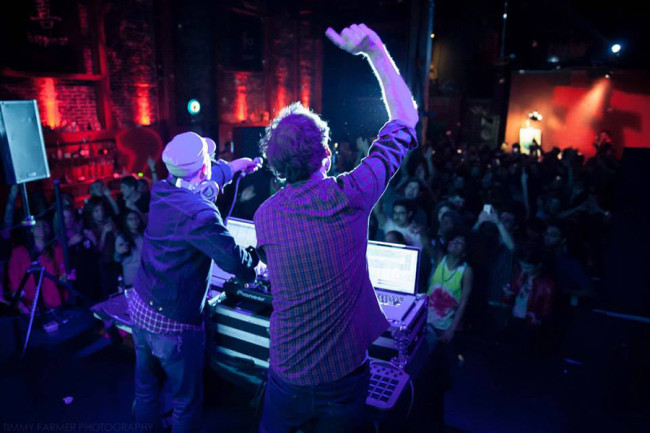
In 2007, indie rock band members Aaron Brink and Steve Riddell decided to start putting together some of their favorite songs, mixing music across genres and putting the results online for anyone and everyone to download.
Fast forward seven years and the guys are still at it as the Hood Internet, weaving together songs from Jay Z and Daft Punk, Destiny’s Child and Justice, or Crystal Castles and Rihanna, to create something wonderfully unique out of used material.
Now, they’re on the road, touring around the country to play their mixes and original music from 2012’s FEAT.
Before their concert this Saturday at the Granada Theater, The Daily Campus sat down to hear from Mr. Riddell and get a glimpse into the duo’s creative process.
Daily Campus: You and Aaron started together in an indie rock band. How did you make the transition to electronically produced music?
Steve Reidell: It kind of seems like a large jump but in the same sense but we sample a lot of indie rock. People’s interest in music has became a lot wider and we were no exception in that. We had a wide base of things to sample from. We focused entertain ourselves at first.
DC: When did you decide to make DJing a full-time job? When did you realize you could do this full time?
SR:There was never really a conscious decision but it was exciting to have a project that took the attention of people. When the time came to do DJ sets, that was really exciting and pushed us to make more music. Even the initial burst of interest was really encouraging.
DC: All of your mixes are free and available to anyone online. Why not charge for your music?
SR: Sampling such large portions of songs makes charging seems pretty just disingenuous. In this era of music, people just want music for free. It’s good to know that there are people out there that buy music. Some people are buying vinyl records, but going to see music is what people are spending their money on. It wouldn’t be right to charge money for our mixes. We may have assembled them but it doesn’t make them our intellectual property.
DC: In 2012, you released your first original album. How was that process different than the mixes you had put together before?
SR: Putting out original music we made was not necessarily a new thing. But we thought, what if we tried to make a batch of songs that would sound like a remix but we’ll make new songs instead. It was a lot like playing as a band, a lot of song writing, and collaboration with over 20 people.
DC: In 2009, Estelle, the Ting Tings, and Kylie Minogue recreated one of your mixes live at the Brit Awards. Did you know they were using your material? How did you feel when you saw their performance?
SR: The Estelle thing was interesting. We had been getting some texts and emails saying they’re doing your mash-ups on the Brit awards. But it doesn’t seem totally out of bounds. It not like they stole something from us. We stole something from them and they realized they could do something with it.
DC: You mix a lot of obscure music together, matching songs that we would never put together that go together perfectly. How do you put your mixes together?
SR: We don’t think it like “Would X fit with Y.” There are songs that we think that and it fails miserably. But what works is when we hear rhythmic patterns and then we take a stab at mixing them based on that.












